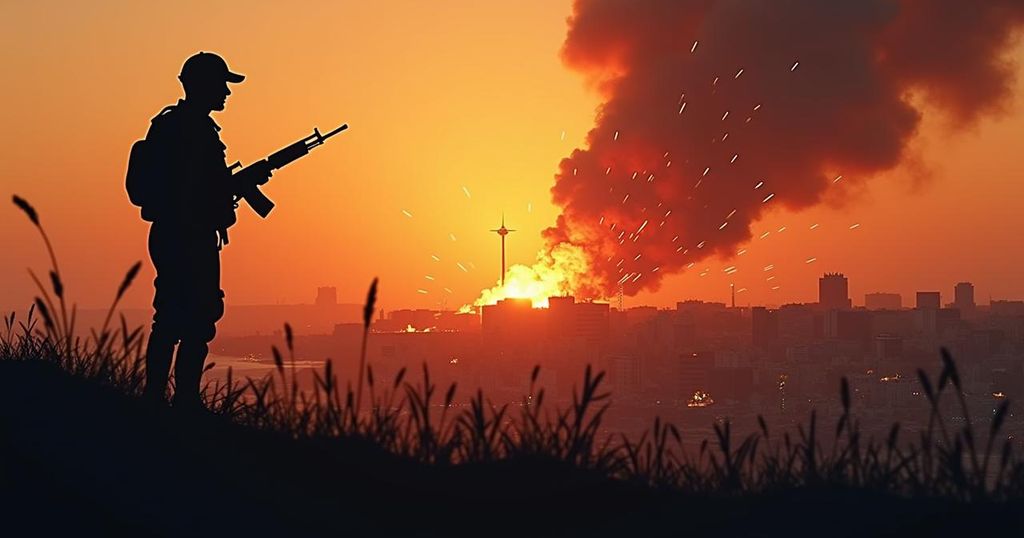Escalating Tensions: Iran Strikes Israel as Conflict Intensifies in the Middle East

Iran recently launched missile strikes on Israeli targets, leading to Israeli Prime Minister Netanyahu’s pledge for retaliation. Ryan Costello of the NIAC highlighted the dangerous escalation dynamics and criticized U.S. support for Israel’s aggressive policies. The situation has already resulted in numerous casualties in Lebanon and fueled broader concerns of conflict in the region.
In an alarming escalation of hostilities, Iran launched a barrage of ballistic missiles targeting significant military and security installations in Israel, prompting Israeli Prime Minister Benjamin Netanyahu to declare a forthcoming response. Ryan Costello, who serves as the policy director for the National Iranian American Council (NIAC), cautioned that the precarious situation in the Middle East reflects a dangerous interplay where each faction endeavors to redefine their boundaries, thereby heightening the risk of profound devastation. Costello emphasized that an upsurge in violence is unlikely to lead to de-escalation but may amplify the cycle of retaliation, notably referencing reports from Axios that indicated the Biden administration endorsing Israel’s strategy of “de-escalation through escalation” vis-à-vis Hezbollah. He noted, “An eye for an eye makes the whole world go blind,” cautioning against the ongoing propensity for escalation among the involved parties. Moreover, Costello criticized President Biden’s seeming unconditional support for Netanyahu’s expansive military endeavors in Gaza and Lebanon, which he argues has contributed to Iran’s heightened aggressive stance. He appealed for proactive American leadership to restrain Israel and prevent further deterioration of the situation. As the Israeli military urged evacuations in certain southern Beirut areas due to their proximity to Hezbollah strongholds, the ongoing assaults in Lebanon exacerbated tensions, with reports indicating around 55 fatalities in a single day. The accumulated death toll over the past year nears 2,000, surpassing the casualties of the 2006 conflict. Following the Iranian missile assault on Israel, anticipation looms regarding potential further escalations. Additionally, United States Republican House Speaker Mike Johnson issued a statement advocating for a robust U.S. response to Iran, condemning the recent violence and criticizing the current administration’s foreign policy approach. Johnson remarked, “The strategy of appeasement has failed, and a policy of interdiction is not enough,” advocating for a return to a “maximum pressure campaign” against Iran, insisting that decisive economic and potential military repercussions are warranted to deter further aggressive actions. The Israel Defense Forces reported at least 55 deaths and numerous injuries attributed to Israeli airstrikes on southern Lebanon within a 24-hour period, reinforcing the urgent need for updated briefing and analysis as the situation evolves.
The recent conflict between Iran and Israel represents a severe escalation in ongoing tensions in the Middle East. At the heart of these hostilities are issues related to military posturing, territorial control, and diplomatic relations involving significant regional players, notably Iran, Israel, and the United States. The long-standing animosities in the region have been exacerbated by various military confrontations, including the Israeli-Palestinian conflict and Iranian influence through proxy groups like Hezbollah. Current developments highlight the increasingly precarious landscape, where military responses may lead to wider regional confrontations.
The escalation of missile exchanges between Iran and Israel signals a critical juncture in Middle Eastern geopolitics, characterized by heightened military responses and a potential for wider conflict. As both parties prepare for further engagements, the need for effective diplomatic intervention remains pressing. The responsibility lies heavily with the United States and its allies to address the underlying issues and seek de-escalation pathways to prevent further loss of life and regional instability.
Original Source: www.aljazeera.com





